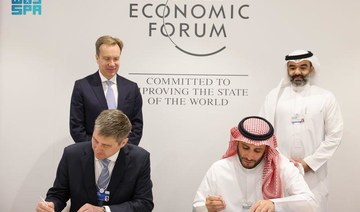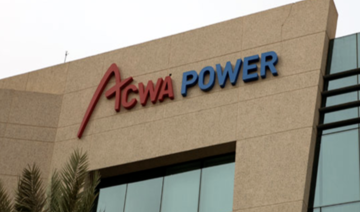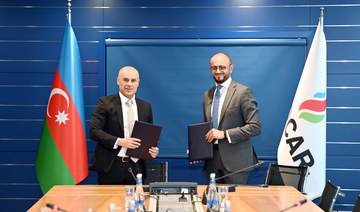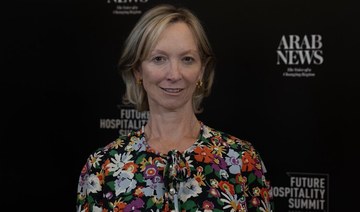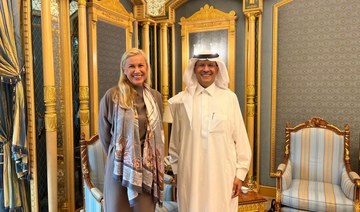FRANKFURT: Ride-hailing service Uber has sounded out car companies about placing a large order for self-driving cars, an auto industry source said.
“They wanted autonomous cars,” the source said.
“It seemed like they were shopping around.”
Loss-making Uber would make drastic savings on its biggest cost — drivers — if it were able to incorporate self-driving cars into its fleet.
Volkswagen’s Audi, Daimler’s Mercedes-Benz, BMW and car industry suppliers Bosch and Continental are all working on technologies for autonomous or semi-autonomous cars.
Earlier on Friday, Germany’s Manager Magazin reported that Uber had placed an order for at least 100,000 Mercedes S-Class cars, citing sources at both companies.
The top-flight limousine, around 100,000 of which Mercedes-Benz sold last year, does not yet have fully autonomous driving functionality.
Another source familiar with the matter said no order had been placed with Mercedes-Benz. Daimler and Uber declined to comment.
Auto industry executives are wary of doing deals with newcomers from the technology and software business who threaten to upend established business models based on manufacturing and selling cars.
“We don’t want to end up like Nokia’s handset business, which was once hugely profitable...then disappeared,” a second auto industry source said about doing a deal with Uber.
So-called “autonomous vehicles” have for years been a distant dream but technology advances and a push by Google , with its huge financial resources, to introduce a prototype have shifted the race to build them up a gear.
Analysts at Exane BNP Paribas have said they see a $25 billion market for automated driving technology by 2020, with vehicle intelligence becoming “the key differentiating factor.”
But the brokerage does not expect fully automated cars to hit the road until 2025 or 2030, in part due to regulatory hurdles.
In August 2013, Mercedes-Benz responded to the Google push by developing an S-class limousine that drove between the German towns of Mannheim and Pforzheim without any driver input. The 103 km stretch is known as the Bertha Benz route, named after the driver of the first ever car, around 130 years ago.
Mercedes rival BMW recently said it was considering launching its own ride hailing service in what would amount to a rival business to Uber.
“The value creation is shifting from the actual hardware toward software and services,” BMW’s new CEO Harald Krueger said on Wednesday. That shift is expected to accelerate with the emergence of computer-driven autonomous vehicles, and BMW is investing in software and technology expertise as a result.
A key hurdle to driverless cars has been the question of liability in the event of an accident. Most countries are signatories to the 1968 UN Convention on Road Traffic which stipulates that a person, rather than a computer, must be in control of a vehicle.
In February this year, US vehicle safety regulators softened the rules to allow driverless cars, by saying an artificial intelligence system piloting a self-driving Google car could be considered the driver under federal law, a major step toward ultimately winning approval for autonomous vehicles on the roads.
Individual states and some countries have granted permission to test self-driving cars. The US state of Nevada passed a law in June 2011 to allow test drives of autonomous vehicles there.
Auto industry executives say regulators are likely to help pass legislation for self-driving cars if these help cut congestion and pollution.
Uber seeking to buy self-driving cars
Uber seeking to buy self-driving cars
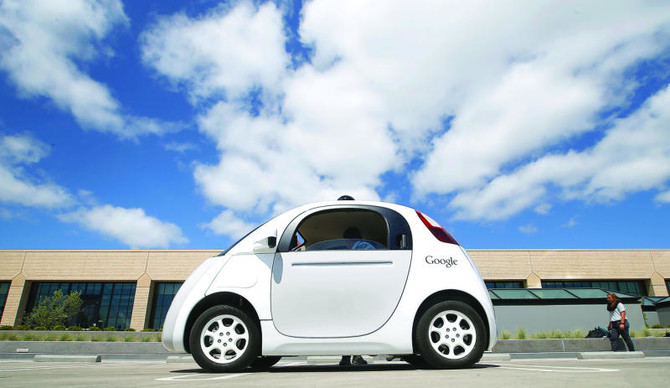
Sudan to pursue nuclear energy, exploit gold resources: Energy minister
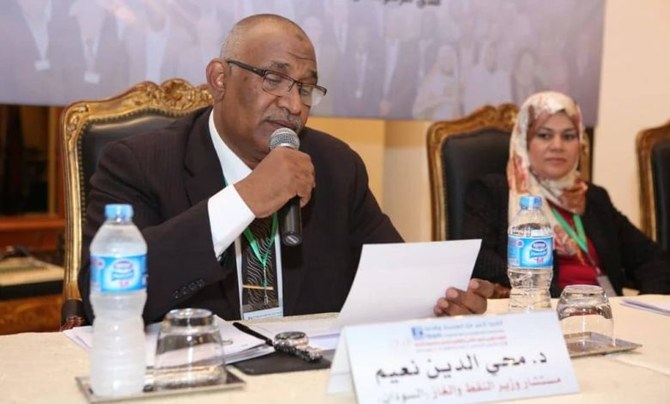
- Energy, mining ministries combined, says official at WEF meeting
- Nuclear power will ‘accelerate’ industrial developmental progress
RIYADH: In a bid to boost the country’s development, Sudan has consolidated its energy and mining ministries, and is pursuing nuclear power as a source of electricity, a senior official said at the World Economic Forum here on Monday.
Speaking to Arab News, Minister of Energy and Petroleum Moheiddin Naeem Mohamed Saeed said the merging of the ministries is aimed at capitalizing on the nation’s gold resources. Pursuing nuclear energy would boost the war-torn country’s development, he added.
“Sudan’s significant gold production will be leveraged to drive development in other sectors,” the minister said.
Meanwhile, Saeed said that he found the discussions on nuclear energy during the WEF event beneficial, adding that his country has begun the process of developing its nuclear-power sector.
“Having completed the initial two steps, it is now high time to seriously consider nuclear energy, given it is safe. This action will accelerate Sudan’s industrial and developmental progress, potentially spearheading reforms in the energy sector, which is a key indicator of a country’s level of development,” Saeed said.
He said that discussions around energy were critical for all nations. “Energy is no longer a private matter; it is a concern that resonates worldwide. Access to energy is a fundamental right for people everywhere. With the evolving quality of life, energy has become indispensable. From household appliances to industrial machinery, our modern way of life relies heavily on energy,” he said.
Saeed added that the WEF special meeting provides a platform for participants to discuss different energy sources and strategies for investing in them optimally, while keeping costs as low as possible, and developing industry standards.
“This forum seeks to unite the global regulations and provide safe and available energy,” he said.
Saeed said Sudan was developing relations with other nations with regard to energy provision. “We have a power interconnection with Ethiopia, and we have a power interconnection with Egypt; they are our neighbors. We have a big goal to achieve in Africa, which is to pursue this interconnection. So, African countries exchange energy,” he said.
He emphasized that Africa, known for its economic challenges, requires collaborative efforts among its nations to address energy issues effectively. “Energy has become an indicator of whether a country is advanced or not, as I previously said. They strive to integrate electricity and energy in general.”
Saeed said that as an oil-producing country, Sudan had undertaken projects with China and Malaysia. “In early 2000, our oil production reached 500,000 bpd (barrels per day), after the country split into two with the establishment of South Sudan, where most of the oil projects were located.
“Our big challenge now is to cooperate with oil old players or the new ones everywhere, as we have no political issues with any country, and this is business. We have a substantial oil reserve in the north,” he said.
He said Sudan has only exploited 20 percent of its known oil reserves for energy, and the government was striving to maximize production due to high demand.
“We currently meet 40 percent of our energy requirements. Additionally, we have initiatives in solar, thermal and wind energy to generate electricity. Moreover, our river systems, supported by numerous dams, contribute to half of Sudan’s power supply, and we are making significant progress in this area.”
On gas, he said Sudan has potential fields in the Red Sea, and are transitioning electricity stations to utilize more of this source.
Saudi minister stresses energy security importance amid climate concerns
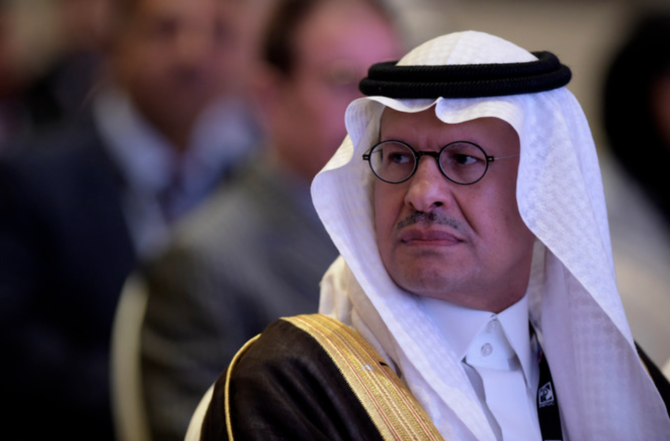
RIYADH: Energy security does not need to be sacrificed to deal with climate concerns, one of Saudi Arabia’s top ministers has insisted.
The Kingdom’s Energy Minister Prince Abdulaziz bin Salman flagged made the comments at a dialogue session titled “Energy Security, Future of Energy, and Sustainable Development” during the 2024 IsDB Group Annual Meetings in Riyadh.
His warning come as climate change discussions now include a focus on innovative solutions such as renewables and advanced technologies while ensuring energy security and economic growth.
Prince Abdulaziz stated: “We believe in the reality of the climate crisis, but we support dealing with it according to the priorities of each country.”
He added: “Our issue is not recognizing the existence of the problem of climate change, but rather how to deal with it in a fair and direct manner, taking into account the differences in the national circumstances of countries.”
The minister stressed the importance of collaboration and collective action, noting Saudi Arabia’s proactive engagement on global warming.
“The Kingdom has the second lowest intensity of carbon dioxide and methane emissions in the world, and countries that occupy lagging positions must follow our approach,” he emphasized, urging nations to unite and work together toward effective solutions.
“The discussion on the issue of climate change must be realistic and logical to enable all parties to cooperate in confronting this global issue,” the minister added.
The energy minister joined a growing chorus of high-profile figures discussing the trade-offs between energy security and climate concerns.
In March, President and CEO of Aramco Amin Nasser called for a new approach to the energy transition that incorporates oil and gas, saying the current strategy “is visibly failing on most fronts.”
Speaking at the same meeting as Prince Abdulaziz in Riyadh, Muhammad Al-Jasser, president of the Islamic Development Bank, highlighted the institution’s commitment to green projects through innovative financing mechanisms.
“Anytime you have a green project, you can issue sukuk against it. Once you have those green sukuks, you can create green assets against it and then you have a virtual cycle triggered into the process and we’re already there,” he explained.
Al-Jasser emphasized the bank’s proactive approach to catalyzing change rather than waiting for it.
“This year is going to be a bumper year for us, we’re going to be issuing $6 billion of sukuk; some of it will be green. This is our way of helping and not waiting too long to bring about that change,” he said.
Addressing the financing challenges associated with the energy transition, he emphasized the progress made by IsDB in increasing funding for sustainable projects.
“We will provide financing within our abilities and we do it with also all of the other Arab lending institutions,” he explained.
He continued: “There’s the Arab Coordination Group, we compare notes and we go out and we finance some of these projects like the hydro dams that we have financed together and that helps a lot with the transition and with the creation of sufficient energy to fuel these economies.”
However, he acknowledged the financial constraints and emphasized that the transition must be realistic and inclusive, stating: “We will never have enough money, and therefore the transition has to take that into account.”
Malaysia to witness $10bn investment from ACWA Power in renewable energy sector: prime minister
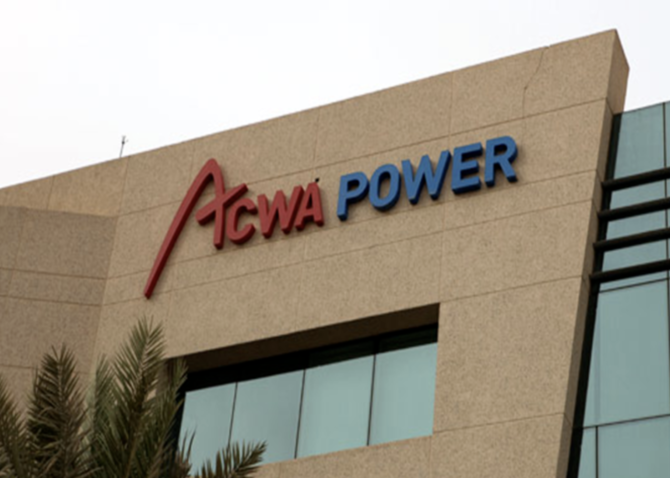
RIYADH: Saudi utility firm ACWA Power has expressed interest in investing $10 billion in Malaysia over the next 10 years to develop renewable energy projects.
According to a report by the Malaysian National News Agency Bernama, ACWA Power will collaborate with Cypark Resources Bhd on the developments.
Malaysian Prime Minister Anwar Ibrahim confirmed this news on his Facebook page following a meeting with ACWA Power Chairman Mohammad Abunayyan on the sidelines of the World Economic Forum in Riyadh.
Ibrahim said that the Saudi firm is prepared to collaborate with strategic partners in Malaysia to develop multiple renewable projects across various states in the nation.
“I express my appreciation for ACWA Power’s commitment to increasing its investments in Malaysia and informing that the country always welcomes any effort that contributes to the economic growth of the country and the prosperity of the people,” Ibrahim wrote on his Facebook page.
He added that ACWA Power has already presented several investment proposals, which include developing renewable sites in Kelantan, Perlis, and Johor, as well as in Terengganu and Sarawak.
The prime minister said Malaysia will continue to implement investment-friendly policies, with a focus on initiatives ensuring that every deal is simplified and expedited.
Earlier this month, ACWA Power signed a new agreement with SOCAR, the state oil company of Azerbaijan, to accelerate the development of renewable projects in the nation.
“The primary directive of the agreement will be to enhance SOCAR’s carbamide fertilizer facility, striving toward more value-added low-carbon products,” said ACWA Power in a statement at that time.
In the same month, the Saudi-listed firm also signed another deal with the International Renewable Energy Agency to accelerate the adoption of clean energy worldwide.
Under the deal, the utility developer will work closely with IRENA to share crucial insights on infrastructure investment in renewable energy, green hydrogen advancement, solar energy, and the intersection of energy and water.
ACWA Power and IRENA will also investigate avenues to mobilize finance and investment for renewable projects, along with supporting infrastructure for the development, storage, distribution, and transmission of clean energy.
Saudi Arabia open to readjusting 150m tourists Vision 2030 target if goal achieved early, official reveals

RIYADH: Saudi Arabia is open to readjusting its goal of attracting 150 million visitors by 2030 if those numbers are achieved ahead of time, according to the deputy minister of destination enablement at the Ministry of Tourism.
Speaking in an interview with Arab News on the sidelines of the first day of the Future Hospitality Summit taking place in Riyadh from April 29 to May 1, Mahmoud Abdulhadi explained that targets are adjusted based on performance.
“As we hit our target seven years ahead of target, our 100 million target, we therefore now have a new target,” Abdulhadi said.
“I’m sure if we were to hit that new target with a significant overperformance in terms of the timeline, our targets would also be adjusted,” he added.
The deputy minister went on to stress that this does not affect the ministry’s plans significantly as the entity works to ensure the sector is sustainable and can grow.
“The fact that we’ve been able to absorb the 100 million tourists in the last year, and we will continue to see growth in that figure, it just means that some of our plans may need to be accelerated, some of them may need to be modified a little bit,” Abdulhadi highlighted.
“But we’ve always been planning to make sure that that sustainability and that growth is embedded in everything that we do,” he affirmed.
The deputy minister clarified that there will be no change in terms of how the entity will deliver. Instead, there may be some modifications regarding its tactical priorities as well as delivery timelines.
Regarding the ministry’s secondary role as the sector’s regulator, Abdulhadi underlined that the organization is working to promote the industry from an investment perspective to create a visitable and sustainable field.
“In order to do this, that enablement means that we are cascading down our national tourism strategy and our national targets onto and through our partners in the government, be they the other ministries, because, as you know, tourism is a very horizontal sector; we cover a lot of of other industries,” he empathized.
Abdulhadi also mentioned that the ministry is working with the regional development authorities to help ensure that they are delivering on the promise made at the national level to conceive these destinations correctly.
“So again, we are the regulator, and we are there to make sure that the environment is in the right place, it is in the right regulations, and it is in the right attractiveness to investors and visitors alike,” the deputy minister said.
“We are definitely working with the private sector to help facilitate for them, where investors come in and they bring in operators. We try and assist both parties on making sure that the product that is delivered meets our ambitions,” he added.
Discussing the pledge to create one million additional jobs in the sector, Abdulhadi explained how the ministry is currently engaging with several international operators and providers of training facilities and education.
“We’ve committed to train over 100,000 Saudis a year, and in order to do this, we’ve teamed up with with the best people globally and domestically in order to deliver on those training programs,” Abdulhadi concluded.
More than 1,200 global investors are expected to partake in FHS. The event, which is being held at Al-Faisaliah Hotel, will focus on sustainable tourism and technology-driven hospitality under the theme, “Invest in Tomorrow: Today, Together.”
Industry leaders are projected to discuss sustainable development, investment prospects, entrepreneurship, and human capital, as well as gain insights into the continued expansion of the Kingdom’s hospitality and tourism sectors.
Saudi Arabia and Mauritania forge energy pact, emphasizing expertise exchange
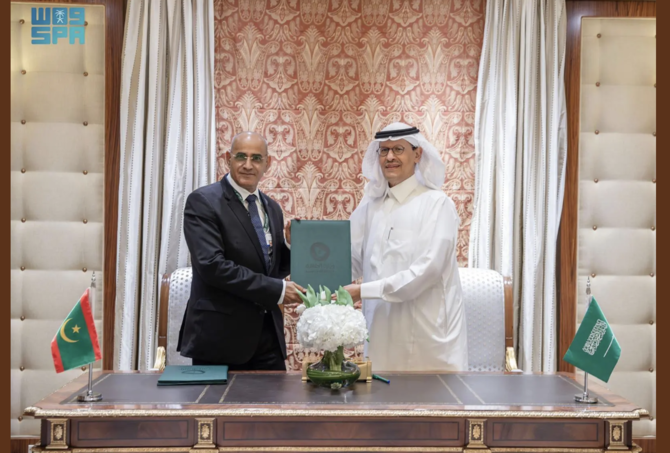
RIYADH: Saudi Arabia and Mauritania have signed a framework agreement aimed at exploring opportunities and fostering expertise exchange in the fields of electricity, renewable energy, and clean hydrogen.
The memorandum of understanding was signed during the recently concluded World Economic Forum Special Meeting in Riyadh, where Saudi Minister of Energy Prince Abdulaziz bin Salman and Mauritania’s Minister of Petroleum, Mines, and Energy, Nany Ould Chrougha, met.
The MoU encompasses promoting the exchange of expertise and exploring partnership opportunities in renewable energy sectors such as solar, wind, waste-to-energy, and geothermal energy, according to the Saudi Press Agency.
Moreover, the deal focuses on enhancing the reliability and security of the electricity system through development and improvement initiatives.
Moreover, the agreement involves exploring prospects for joint project development, technology transfer in the electricity and renewable power sectors, and potential collaborations in clean hydrogen and energy technologies.
These aim to advance and employ cleaner fossil fuel technologies, utilizing the most effective available methods and practices to mitigate environmental impacts. This includes initiatives such as carbon dioxide separation, capture, storage, and utilization, as well as enhancing energy production and consumption efficiency.
According to a report on renewable energy opportunities for Mauritania, published in November 2023 by the International Energy Agency, the northwest African country boasts abundant wind and solar resources. The extensive utilization of these resources could significantly aid in providing universal electricity access and realizing sustainable economic growth.
The IEA report, the first of its kind focused solely on Mauritania, explored the potential advantages of expanding the nation’s renewable energy capabilities.
“Deploying these resources at scale to generate low-cost renewable electricity and hydrogen through electrolysis could attract large-scale investments and kick-start Mauritania’s energy system transformation, allowing the country to close electricity access gaps and spur clean and sustainable development,” the report stated.
It added that with the largest pipeline of renewable hydrogen projects in sub-Saharan Africa by 2030, Mauritania could emerge as a significant producer of renewable hydrogen at a competitive price.
Additionally, the report delved into an analysis of the water requirements for hydrogen production and evaluated the feasibility of enhancing the accessibility of potable water through seawater desalination.


